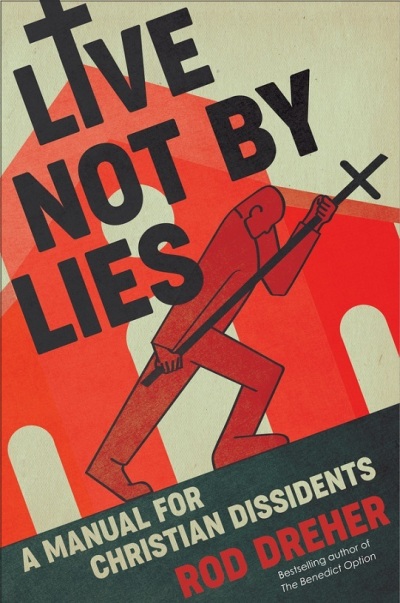'Live Not by Lies' prophetic in creeping totalitarianism in America (book review)
Live Not by Lies starts like most good books start, with a terrible and mysterious warning from a stranger. In 2015, journalist Rod Dreher received a phone call from an American doctor of Czech origin, who told the reporter that events happening now in America reminded his mother of the communist takeover of Czechoslovakia.

The phone call seemed absurd to Dreher at first, but the more he learned about how the communists used fear, social pressure and ideology to enslave the people of Eastern Europe, the more he realized that America may be close to totalitarianism.
Released earlier this week on Amazon, Dreher’s book is the #1 best seller in the Christian Spiritual Growth category at the time of this article’s publishing.
Dreher tells readers that totalitarianism means an ideology that tries to control every aspect of life. When people are lonely, disconnected from the past, distrustful of their institutions and motivated by ideology rather than truth, societies often embrace totalitarian thinking. People prefer the brutal control of totalitarianism over a freedom that feels loveless and meaningless.
In 2020 America, many people don’t love our nation’s tradition of freedom, Dreher observes.
If you’ve hidden your political opinions because your company might fire you for them, looked over your shoulder while discussing unpopular beliefs with a friend or seen yourself “cancelled,” you’ve already experienced some of what Dreher calls “soft totalitarianism.”
Unlike the Soviet Union’s “hard totalitarianism” of prisons and torture, this totalitarianism controls people with social and economic pressure, using modern surveillance tools to enforce conformity.
The ideology it enforces will come from today’s post-Christian left, Dreher writes. As the Western world moved away from Christianity, our definition of freedom shifted. In the Christian worldview, freedom means choosing what pleases God. In the post-Christian worldview, freedom means choosing whatever you want without criticism or constraint.
Post-Christian society will try to force Christians to lie so that its members can do what they want without being confronted by reality. Dreher provides several timely examples: “Men have periods. The woman standing in front of you is to be called ‘he.’ Diversity and inclusion mean excluding those who object to ideological uniformity.”
The enforcers in the society of lies won’t be who you expect. Instead of government tyranny, big businesses like Amazon, Google, Facebook and credit card companies will use their enormous economic power and information gathering capacity to change the behavior of customers. Ordinary people will join in out of fear and the desire to take part in the cause of “tolerance.”
If a Christian florist refuses to cater a gay wedding, Google will direct searches away from his website, social media mobs will attack him online, colleges will reject his kids and credit companies will cancel his cards. Companies and customers that cancel business with him may do so because they’re afraid of getting the same treatment from others.
Under soft totalitarianism, private businesses and people acting without state pressure will be everyone’s tyrants. Victims will be spied on by their own “smart devices.”
Even now, companies can use apps to track disturbing amounts of information. Smartphones tell app companies our location, Gmail processes our emails for advertising information, website browser cookies track our online reading habits and smart televisions tell companies our TV habits. We pay for surveillance we would never tolerate from the government because it makes our lives convenient.
“Consumerism is how we are learning to love Big Brother,” Dreher says.
Dreher sees little hope that politics will change our culture’s drift into soft totalitarianism. Christians have lost the culture war, and even churches find themselves consumed by the post-Christian cult of self-fulfillment, he writes.
Instead of putting our hope in politics, we must deepen our faith in God and build up our families, following the example of Christian dissidents under communism. Lonely individuals don’t have the strength to stand against totalitarianism, but people with family, a sense of history and faith in God can.
In the book’s most vivid chapters, Dreher tells stories of the Soviet underground church. Defying a government that taught love of coercive power, Christians taught their children to love truth. Together, they formed small, supportive communities of faith that gave each other strength and preserved their national culture.
The results lit candles of hope in strange places. Christian prisoners prayed and miracles happened, leading hardened criminals to Christ. Printing presses hidden in secret basements brought truth in literature to everyday people. People sacrificed careers that required compromise and found themselves rewarded with God’s peace.
To the world’s surprise, the truth set people free. The courage, endurance and suffering of Christians who would not lie brought down the world’s mightiest totalitarian state.
Dreher’s book takes its title from famous dissident Aleksandr Solzhenitsyn’s last article for the Soviet public before his exile to the West. The great author told people to “live not by lies” by refusing to go along with statements, meetings, politicians and journalism that didn’t tell the truth.
Although Dreher’s analysis of soft totalitarian trends and what they mean is well-researched and may be prophetic, the heart of his message lies elsewhere. When the church lives out God’s purpose, it always finds itself condemned, opposed and despised alongside Christ. At all times, Christians should put their hope in God and their effort into building his kingdom.





















